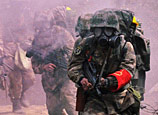
According to data released by the bureau on Sunday evening, 54 businesses in Beijing have cut their emissions by 30 percent, 28 construction sites have stopped foundation work, Beijing Hyundai Motor Co temporarily halted production on Sunday and one production line has been suspended at Beijing Cement Plant Co.
While experts praised the warning as timely and precise, they also criticized the preventive measures for being too lax.
"I feel the restrictions on motor vehicles are still too light," said Pan Xiaochuan, a professor at Peking University's School of Public Health. "As the pollution occurred in the weekend instead of during the working week, the use of official vehicles had already been reduced naturally."
Pan emphasized that the current plan has no legal backup. "In some countries in Europe, at least half of the motor vehicles are barred from using the roads on heavily polluted days, according to law," he said.
Zhou Rong, director of the Greenpeace climate and energy project in Beijing, added that the smog has enveloped many provinces and therefore emergency plans employed by individual cities are unlikely to be satisfactory.
"A regional emergency action plan is required," she said. "We can expect a better solution, if the government will is there."
Peng Yining, Jiang Xueqing, Shan Juan and Shi Yingying contributed to this story.

















 China's social trust index declined further last year, according to the Annual Report on Social Mentality of China 2012
China's social trust index declined further last year, according to the Annual Report on Social Mentality of China 2012


![]()
